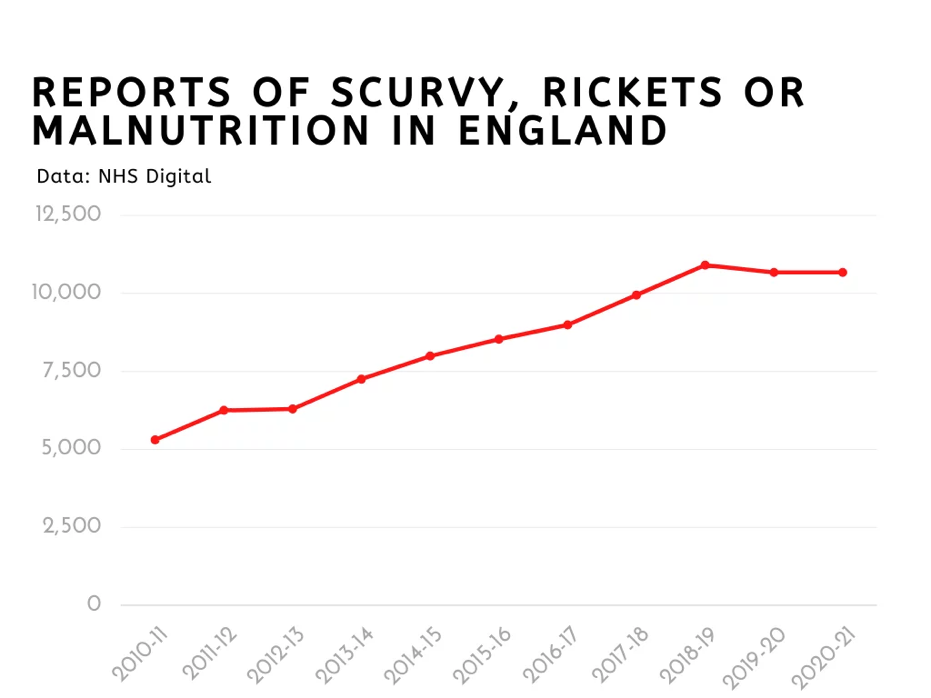The History of Nutritional Medicine.


The first disease to be knowingly treated with nutrition was probably scurvy, a disease caused by vitamin C deficiency. In the 1700s, only non-perishable foods such as dried meat and bread could be stored in ships bound for long voyages. After a month or so at sea many sailors developed symptoms of extreme tiredness, swollen and bleeding gums, and purple and swollen legs. In 1747 Dr James Lind, a ships physician in the British Navy, carried out a simple experiment and discovered that eating limes successfully resolved the symptoms the sailors were suffering.
The first disease to be knowingly treated with nutrition was probably scurvy, a disease caused by vitamin C deficiency. In the 1700s, only non-perishable foods such as dried meat and bread could be stored in ships bound for long voyages. After a month or so at sea many sailors developed symptoms of extreme tiredness, swollen and bleeding gums, and purple and swollen legs. In 1747 Dr James Lind, a ships physician in the British Navy, carried out a simple experiment and discovered that eating limes successfully resolved the symptoms the sailors were suffering.

Lind could not have known that he had uncovered an important function of vitamin C. It wasn’t until 200 years later, in the 1930s this essential nutrient was identified and formally named.
Between 1910 and 1950, several vitamins and minerals were isolated and named including the B vitamins and vitamin A. In 1932, Vitamin C was isolated and formally documented. Following on into the second half of the century, 1950- 2000, advances in nutritional science focused on establishing policies, establishing nutrient intake guidelines and protein intakes. Food fortification also came into practice to help increase dietary intakes of at-risk nutrients.
After 2000, the importance of dietary patterns became better understood. In developed countries, public health concerns grew because of the upsurge in non-communicable diseases. A paradox became apparent; malnutrition existed in countries where there was food insecurity, as well as in nutrition-rich countries. Malnutrition in food insecurity usually manifests as energy and protein deficiency, while malnutrition in nutrition-rich societies manifests as obesity, type 2 diabetes, cardiovascular diseases, and cancer (non-communicable diseases).
Today, nutrition has become a highly complex science. Investigations have provided knowledge of nutrient-disease risk pathways, epigenetics, the gut microbiome, the gut-brain axis, inflammatory disorders, oxidative stress, food processing, behavioural approaches and so much more! The vital importance of nutrition to human health is firmly established and continues to strengthen.
We have all this knowledge, so why is the incidence of non-communicable diseases and diseases long associated with poverty and chronic malnutrition increasing?
Even diseases where the cure is as simple as a piece of fruit are increasing. Lind would think we have learnt nothing since 1747 because according to The Big Issue, even the incidence of scurvy has doubled since 2010 (figure 1).

With So Much Knowledge- Why are we not healthy?
Approximately 75% of all deaths each year are related to nutritionally related non-communicable diseases such as cancer, diabetes, heart disease and conditions linked to obesity. There are so many more nutritionally related disorders that could be listed, those mentioned are just the big ones. Whether we live food abundance or food insecurity we are dying from food-related illness.
“Adults who eat a healthy diet live longer and have a lower risk of obesity, heart disease, type 2 diabetes, and some cancers” (CDC)
“Together with a lack of physical activity, an unhealthy diet is one of the leading global risks to health” (WHO)
Diet related conditions
Osteoporosis
Osteoporosis is a condition that leads to fragile bones, which are likely to break more easily. Bones in the wrist, hip and spine are most vulnerable.
About 3 million people in the UK have osteoporosis, and one in three women and at least one in six men will suffer an osteoporotic fracture in their lifetime. Over 5.6% of the European population over the age of 50 years have osteoporosis, that’s about 32 million people. Nutrition is central to bone health and many nutrients contribute to a healthy bone matrix including calcium, protein, vitamin D and magnesium.
Overweight and Obesity
Eating a healthy diet, along with getting enough physical activity and sleep, can help prevent overweight and obesity. Around 66% of UK adults are overweight or obese which equates to over 35 million people. A high Body Mass Index is associated with an increased risk of many disorders including reduced fertility, high blood pressure, joint problems, diabetes, and certain cancers. The WHO estimates that 167 million of us will be obese by 2025.
Heart Disease and Stroke
Two leading causes of heart disease and stroke are high blood pressure and high blood cholesterol. Consuming too much sodium can lead to hypertension (increased blood pressure). High blood pressure is a risk factor for heart disease, kidney disease and vascular dementia, in fact hypertension is responsible for more than half of all strokes and heart attacks.

Type 2 Diabetes
People who are overweight or have obesity are at increased risk of type 2 diabetes because they are less able to use the insulin effectively. It is estimated that more than 1 in 3 adults have pre-diabetes, a condition that often leads to type 2 diabetes. However, more than 8 out of 10 people with prediabetes don’t know they have it. The number of adults diagnosed with type 2 diabetes has nearly doubled in the last 2 decades as the population increases, ages, and becomes more and more overweight.
Cancer
An unhealthy diet can lead to weight gain, obesity and other conditions that put people at higher risk of over 13 different cancers, including breast cancer in postmenopausal women and colorectal cancer.
Childhood Health
-
- 3% of children in school Year 6 are overweight or obese.
- Obesity rates are twice as high in the most deprived children than the least deprived children.
- Poor diet and low levels of physical activity are primary causes of excess weight in children.
- Childhood obesity rates in England have increased significantly since the pandemic. Two-fifths of children aged 10-11 in England are overweight or obese.

Overweight or obesity in children is associated with emotional changes, low self-esteem, school absence, multiple health issues, and ill health in adult life.
There is a global health crisis, and WE are at the heart of it.
Questions and Answers.
Problem: Good nutritional advice is hard to find.
Answer: It isn’t hard to find if you go to the right place. A dietitian (RD) or AfN nutritionist is qualified to give evidence-based nutritional advice. Hairdressers, health coaches, physiotherapists, your mum’s friend, the majority of medical and healthcare professionals, your gym trainer, any A-list celebrity, any glossy magazine, most people on Instagram, Karen on Facebook and most other people are not qualified to give you specialist nutritional advice. To clarify, qualified dietitians and AfN registered nutritionists offer expert, reliable, safe advice.
Question: Can I find the advice I need on the internet?
Answer: Probably, but you’ll also find a lot of ambiguous, wrong and possibly damaging advice. Can you tell the difference?
Question: Am I part of the global health crisis?
Answer: We all are. Nutritionally related illness and disease is commonplace in every country.
Problem: I don’t know what to eat, the advice changes all the time.
Answer: Good nutritional advice is rarely conflicting or confusing. Over time our knowledge and understanding have grown, and guidelines are updated. Confusing, conflicting advice is rare amongst properly qualified professionals. Avoid reading nutritional reports in newspapers and other media that may lack the complete picture. Look for quotes that you can rely on for accuracy from dietitians (BDA registered) and fully qualified nutritionists (AfN registered)

We understand how difficult it is to find reliable and affordable nutritional advice, so we’re producing a selection of resources to support you in your journey to better health.
Most illnesses and disorders respond to nutritional treatments, make a start towards a healthier life today.
100% is the importance of nutrition to our mental and physical health and the prevention and treatment of illnesses.
BOOK A CONSULTATION
Newsletter Sign Up
Read other blogs in this series
How to eat sustainably
Sustainability has become a buzzword in 2022 and now everything we read is packed with ideas and innovations on how companies and their products plan to become more sustainable. Features on ‘Sustainability’ are literally everywhere, and we celebrate that. With so much...
Welcome to Juliet Wilson Sustainable Nutrition
Sustainable nutrition solution for a healthier, more vibrant life.Many of us would like to wake up each day feeling amazing, alongside living a carbon-neutral life to help to protect the planet. However, the reality is that many of us suffer from a nutrition-related...
Bibliography



